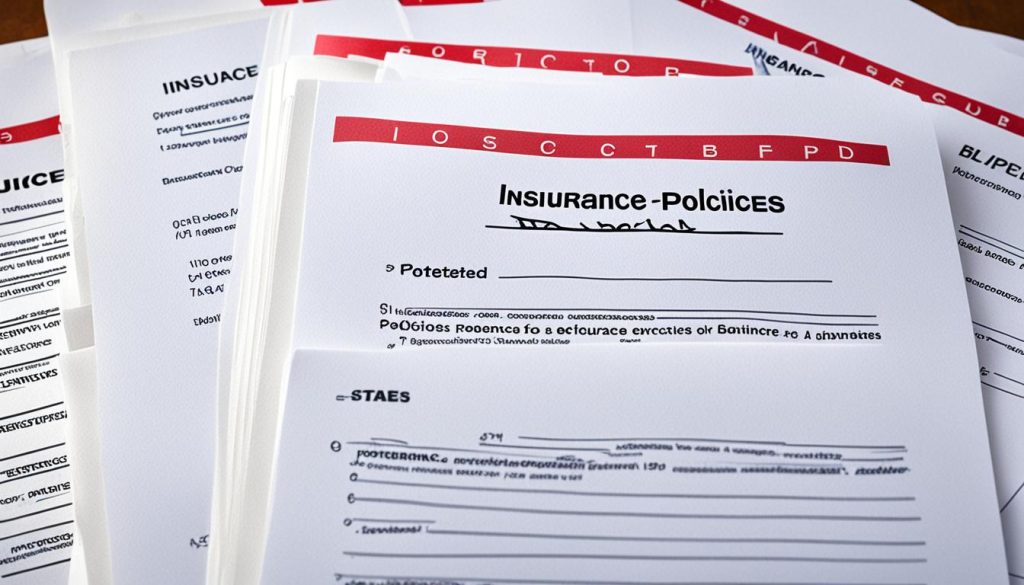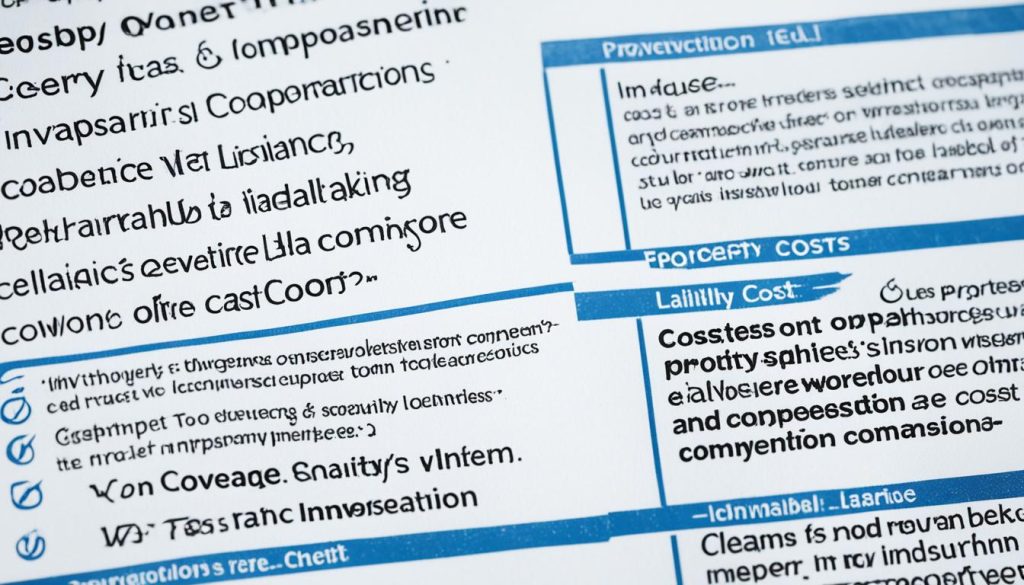Welcome to our comprehensive guide on business insurance! In this article, we will explore the importance of business insurance, the different types of coverage available, and strategies to ensure optimal protection for your enterprise. Whether you’re a small startup or an established company, understanding the ins and outs of business insurance is crucial for safeguarding your assets and mitigating potential risks.
Key Takeaways:
- Business insurance is vital for managing risks and protecting your enterprise.
- There are various types of business insurance to consider, including property insurance, liability insurance, and workers’ compensation.
- Specialized insurance options, such as errors and omissions insurance and data breach insurance, may be necessary depending on the nature of your business.
- When selecting business insurance, assess your specific risks, consult with insurance professionals, and compare quotes to find the best coverage for your needs.
- By choosing the right business insurance, you can have peace of mind and focus on growing your business successfully.
The Importance of Business Insurance
Business insurance is important for several reasons. Firstly, it is often legally mandated, depending on the type of business and the state in which it operates. This means that having insurance coverage is not just a smart choice, but a legal requirement that ensures compliance and protects your business from potential penalties or legal issues.
Secondly, business insurance provides coverage for unpredictable events that can occur in the course of running a business. These events may include natural disasters, such as fires or floods, which can cause significant damage to your property or inventory. Furthermore, business insurance also provides protection against cyberattacks, which are becoming increasingly common in today’s digital landscape. In addition, insurance coverage can also help mitigate liability claims that may arise from accidents or other incidents that occur on your business premises.
This protection is crucial as it can safeguard your business from financial ruin. Without insurance, your business may struggle to recover from the financial impact of unforeseen events. The cost of property damage, litigation, or other liabilities can be overwhelming and potentially lead to bankruptcy or closure. By having business insurance, you can significantly mitigate these risks, ensuring the continuity and stability of your business.
Lastly, having business insurance can also help build trust with investors, customers, and potential employees. Investors are more likely to invest in businesses that have comprehensive insurance coverage, as it demonstrates that the business is prepared for unforeseen events and has measures in place to protect its assets and operations. Customers also feel more secure doing business with companies that are adequately insured, as it assures them that their interests will be protected in case of any mishaps or accidents. Moreover, potential employees are more likely to be attracted to businesses that prioritize their safety and well-being.
Building trust with investors, customers, and potential employees is essential for the long-term success of your business. Having business insurance is one way to demonstrate your commitment to professionalism, stability, and responsible business practices.
Overall, business insurance is a critical investment that provides protection, compliance, and confidence in the tumultuous world of business. By choosing the right insurance coverage, you can safeguard your enterprise from the unexpected, build trust, and set your business up for long-term success.
Types of Business Insurance
When it comes to protecting your business, there are several types of insurance coverage to consider. Each type serves a specific purpose and helps safeguard different aspects of your enterprise.
1. Property Insurance
Property insurance is essential for protecting your buildings, assets, and inventory from unforeseen events such as fire, theft, or natural disasters. It provides coverage to help you recover financially if your property suffers damage or is destroyed.
2. Liability Insurance
Liability insurance shields your business from legal claims and financial responsibilities resulting from accidents, injuries, or allegations of negligence. It covers legal fees, medical expenses, and compensation for damages, ensuring that your business is protected from potential lawsuits.
3. Workers’ Compensation
Workers’ compensation insurance is vital if you have employees. It provides coverage for work-related injuries or illnesses, ensuring that your employees receive medical care and wage replacement if they get injured on the job. This coverage also protects your business from potential lawsuits related to workplace accidents.
4. Commercial Auto Insurance
If your business uses vehicles for daily operations, commercial auto insurance is a must-have. It offers protection for your business vehicles and drivers in case of accidents, damage, or theft. Whether you have a single company car or a fleet of vehicles, this insurance will help cover repair costs, medical expenses, and legal issues.
5. Business Owner’s Policy (BOP)
A Business Owner’s Policy (BOP) is a comprehensive insurance package that combines property and liability coverage. It is designed specifically for small and medium-sized businesses. With a BOP, you can have peace of mind knowing that both your physical assets and potential legal liabilities are covered under a single policy.

By understanding these types of business insurance, you can make informed decisions about the coverage you need to protect your enterprise. Investing in the right insurance policies not only mitigates risk but also gives you the confidence to focus on growing your business with peace of mind.
Specialized Business Insurance
Depending on the nature of your business, you may need specialized insurance coverage to address specific risks and potential liabilities. These specialized insurance options provide additional protection beyond general liability coverage. Let’s explore some key types of specialized business insurance:
Errors and Omissions Insurance
Errors and omissions insurance, also known as professional liability insurance, is designed to protect businesses that provide professional services. It covers claims against negligence, mistakes, or failure to deliver promised services. This type of insurance is especially crucial for consultants, lawyers, architects, and other professionals who provide advice or expertise.
Business Income Insurance
Business income insurance, also referred to as business interruption insurance, safeguards your financial stability in the event of unexpected disruptions. It provides coverage for lost income and helps cover ongoing business expenses during periods of interruption, such as natural disasters or other unforeseen events. This coverage ensures your business can continue to operate and recover quickly.
Data Breach Insurance
In today’s digital age, data breaches are a significant concern for businesses. Data breach insurance, also known as cyber liability insurance, helps mitigate the financial impact of a cybersecurity breach. It covers expenses related to data recovery, legal fees, notification of affected individuals, and potential lawsuits. This insurance is especially crucial for businesses that handle sensitive customer information.
Commercial Umbrella Insurance
Commercial umbrella insurance provides additional liability coverage beyond the limits of your general liability insurance policy. It protects your business from unforeseen and costly liability claims that exceed the limits of your primary policies. Commercial umbrella insurance is essential for businesses that want an extra layer of protection against substantial financial losses resulting from lawsuits or other liability claims.
By considering these specialized business insurance options, you can ensure that your business is adequately protected from a wide range of risks and potential liabilities. Each of these insurance options plays a crucial role in safeguarding the financial stability and success of your enterprise.

How to Select Business Insurance
To select the right business insurance, it is important to assess the specific risks faced by your business. Consulting with experienced insurance professionals can help you evaluate your coverage needs and determine the appropriate coverage options.
Start by assessing business risks unique to your industry and operations. Consider potential hazards like property damage, liability claims, and cybersecurity breaches. Identify any regulatory requirements or contract obligations that dictate the type of coverage you need.
Next, consult with insurance professionals who specialize in business insurance. They have extensive knowledge of the insurance market and can guide you through the selection process. These professionals can analyze your risk profile, provide expert advice, and help you tailor your insurance coverage to your specific needs.
When evaluating coverage needs, take into account factors such as the type of business, location, and assets. For example, a brick-and-mortar retail store may need property insurance to cover physical damage to its premises, while a tech startup may require data breach insurance to protect sensitive customer information.
Obtaining quotes from different insurance providers is crucial to compare costs and coverage terms. This allows you to find the best balance between adequate coverage and cost-effectiveness. Be sure to inquire about any additional features or endorsements that may be relevant to your business.
“Consulting with experienced insurance professionals can help you evaluate your coverage needs and determine the appropriate coverage options.”
Remember, choosing the right business insurance is not a one-size-fits-all solution. It requires careful consideration of your business’s unique risks and needs. Assessing risks, consulting with professionals, evaluating coverage needs, and comparing quotes are essential steps in selecting the optimal insurance coverage for your enterprise.

Conclusion
In conclusion, business insurance plays a crucial role in safeguarding your enterprise from various risks and liabilities. By carefully selecting the right insurance coverage, you can protect your valuable assets, employees, and reputation.
It is essential to have a clear understanding of the different types of insurance available and how they align with your specific business needs. Take the time to assess your risks, consult with experienced insurance professionals, and evaluate your coverage requirements.
Furthermore, comparing quotes from different insurance providers allows you to find the most suitable and cost-effective coverage strategies. With the right business insurance in place, you can have peace of mind and dedicate your efforts to growing your business successfully.




No comments! Be the first commenter?